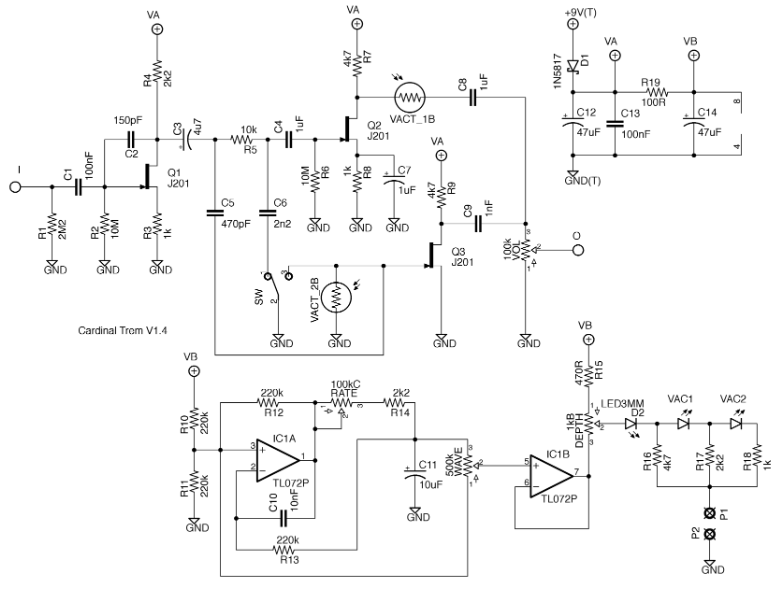Difference between revisions of "Cardinal Tremolo"
m |
m |
||
| Line 12: | Line 12: | ||
<blockquote> | <blockquote> | ||
| − | <div style="background-color: #222222; border: 2px solid #e69710; padding: 10px; {{border-radius|8px}}"> | + | <div style="background-color:#222222; border:2px solid #e69710; padding:10px; {{border-radius|8px}}"> |
This circuit is based in part on RG Keen's Pro-Vibrato schematic. The LFO was adapted from CultureJam's Shoot the Moon Tremolo, which in turn adapted from | This circuit is based in part on RG Keen's Pro-Vibrato schematic. The LFO was adapted from CultureJam's Shoot the Moon Tremolo, which in turn adapted from | ||
Dann Green's Tremulus Lune. Thanks to Jimi Photon for the inspiration and samhay, ~arph, and duck_arse for discussions and suggestions on DIYStompboxes. | Dann Green's Tremulus Lune. Thanks to Jimi Photon for the inspiration and samhay, ~arph, and duck_arse for discussions and suggestions on DIYStompboxes. | ||
Revision as of 21:14, 12 February 2018
The Cardinal Tremolo v1 is a tremolo effect evocative of the harmonic tremolo effect that was available from certain Fender amps, from 1960 to 1963. These amps include:
- The Fender Concert,
- The Fender Pro,
- The Fender Showman,
- The Fender Super, and
- The Fender Twin
Per the build notes document, this is a circuit by Jon Patton and was extensively influenced by previous tremolo pedal designs. In the build notes, Jon credits:
This circuit is based in part on RG Keen's Pro-Vibrato schematic. The LFO was adapted from CultureJam's Shoot the Moon Tremolo, which in turn adapted from Dann Green's Tremulus Lune. Thanks to Jimi Photon for the inspiration and samhay, ~arph, and duck_arse for discussions and suggestions on DIYStompboxes.
Thermionic Studios has purchased this PCB and sourced the parts necessary to build this pedal. We are in the process of building the pedal and will have more to report upon completion.
Controls
- Knob 1 - "Depth": Sets the depth of the volume swell of the tremolo. Clockwise turning increases the depth of the swell.
- Knob 2 - "Rate": Sets the speed of the swell of the tremolo. Clockwise turning increases the rapidity of the period of the swell.
- Switch 1 - "Select": Allows selection between Harmonic and Standard Tremolo functions.
General Information
http://1776effects.com/wp-content/uploads/2015/03/Cardinal-Tremolo.pdf
We currently only have Version 1 of the Cardinal Tremolo pcb. It would appear that 1776 Effects has also released a Version 2. The pedal makes available both the amplike "Harmonic" tremolo, as well as a standard volume-swell tremolo effect. A quick look at both the schematics for v1 and v2 suggests that the only big difference between the two is that the Version 2 board takes what are trimpots (set-em and forget-em) on the board and exposes them as full potentiometers.
Phase Inversion
From our examination of the schematic below, the Cardinal Tremolo, v1 appears to not invert phase on the output as compared with the signal that goes into the pedal.
| Electronic Part | Action | Phase State |
|---|---|---|
| Q1 | Inverts | Inverted |
| Q2* | Inverts | Reverted - please see note |
| Q3 | Inverts | Reverted |
| IC1a* | Inverts | Unaffected - please see note |
| IC1b | Inverts | Unaffected |
- NOTE: The Harmonic/Standard switch splits the signal coming from Q1. The signal is then redirected either to Q2, or Q3, but not both. The end result is a phase that is inverted, and then reverted to the original phase. IC1 appears to invert phase through both portions of the IC, but only modifies the speed and depth controls, and does not modify the signal of the audio going through those controls.
As with all schematic observations, this will need to be born out by testing of the actual pedal.
Pedal Manual
As of this time, 1776effects.com has not issued a separate manual on how to use the pedal. The best current references that we're aware of are this wiki page, or the build manual linked here to the 1776 Effects website which describes the architecture of, and how to build the pedal.
Schematic
- Additional Sources
